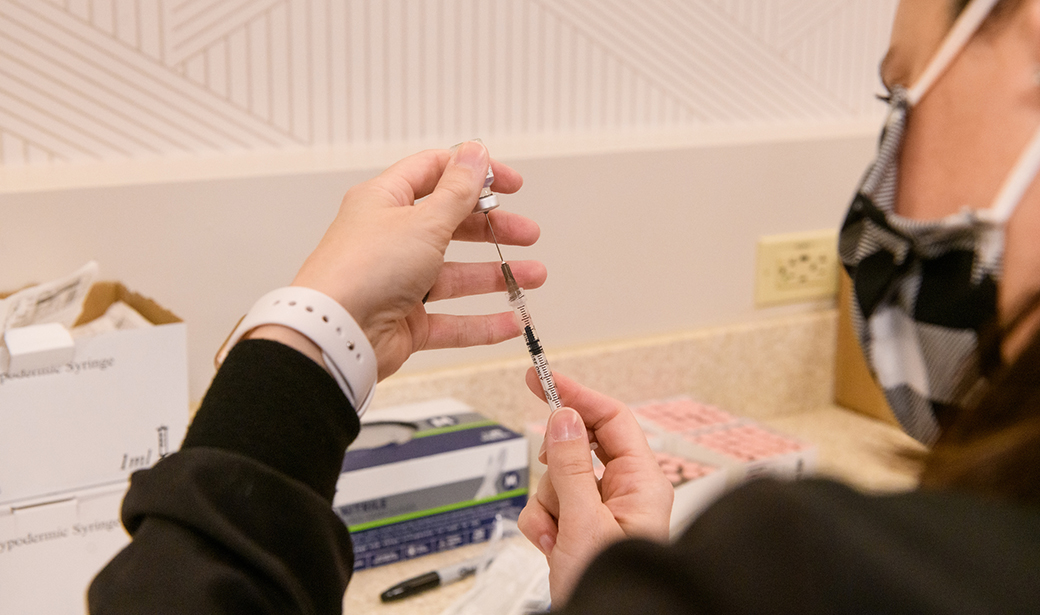Many people are excited to have vaccines as the first step in managing the spread of coronavirus.
Unfortunately, there has been a lot of misinformation surrounding the vaccines and their development. When deciding whether to get the vaccine, it’s important to separate myths from facts.
Myth: The COVID-19 vaccine is unsafe because it was developed so quickly.
Fact: The vaccines are proven safe and effective. Although they were developed in record time, they have gone through the same rigorous Food and Drug Administration process as other vaccines, meeting all safety standards. No steps were skipped. Instead, we can thank the unprecedented worldwide collaboration and investment for the shorter timeframe on the development of the vaccines. The clinical trials and safety reviews actually took about the same amount of time as other vaccines.
Myth: The COVID-19 vaccine will alter my DNA.
Fact: The Pfizer and Moderna vaccines in use contain messenger RNA (mRNA), which instructs cells to make the “spike protein” found on the new coronavirus. When the immune system recognizes this protein, it builds an immune response by creating antibodies — teaching the body how to protect against future infection. The mRNA never enters the nucleus of the cell, which is where our DNA (genetic material) is kept. The body gets rid of the mRNA soon after it’s finished using the instructions.
Myth: The COVID-19 vaccine includes a tracking device.
Fact: A video shared thousands of times on Facebook makes false claims about the products of syringe maker Apiject Systems of America, which has a contract with the government to provide medical-grade injection devices for vaccines. The company has an optional version of its product that contains a microchip within the syringe label that helps providers confirm a vaccine dose’s origin. The chip itself is not injected into the person getting the vaccine.
Myth: The COVID-19 vaccine has severe side effects such as allergic reactions.
Fact: Some participants in the vaccine clinical trials did report side effects similar to those experienced with other vaccines, including muscle pain, chills and headache. And although extremely rare, people can have severe allergic reactions to ingredients used in a vaccine. That’s why experts recommend people with a history of severe allergic reactions — such as anaphylaxis — to the ingredients of the vaccine should not get the vaccination.
Myth: The COVID-19 vaccine causes infertility in women.
Fact: Misinformation on social media suggests the vaccine trains the body to attack syncytin-1, a protein in the placenta, which could lead to infertility in women. The truth is, there’s an amino acid sequence shared between the spike protein and a placental protein; however, experts say it’s too short to trigger an immune response and therefore doesn’t affect fertility.
Myth: I’ve already been diagnosed with COVID-19, so I don’t need to receive the vaccine.
Fact: If you have already had COVID-19, there’s evidence that you can still benefit from the vaccine. At this time, experts don’t know how long someone is protected from getting sick again after recovering from COVID-19. The immunity someone gains from having an infection, called natural immunity, varies from person to person. Some early evidence suggests natural immunity may not last very long.
Myth: Once I receive the COVID-19 vaccine, I no longer need to wear a mask.
Fact: Masking, handwashing and physical distancing remain necessary in public until a sufficient number of people are immune. Fully vaccinated people can meet with other fully vaccinated people without wearing masks.
Myth: You can get COVID-19 from the vaccine.
Fact: You cannot get COVID-19 from the vaccine because it doesn’t contain the live virus.
Myth: Once I receive the vaccine, I will test positive for COVID-19.
Fact: Viral tests used to diagnose COVID-19 check samples from the respiratory system for the presence of the virus that causes COVID-19. Since there is no live virus in the vaccines, the vaccines will not affect your test result. It is possible to get infected with the virus before the vaccine has had time to fully protect your body.
Myth: I’m not at risk for severe complications of COVID-19 so I don’t need the vaccine.
Fact: Regardless of your risk, you can still contract the infection and spread it to others, so it’s important you get vaccinated. Once the vaccine is widely available, it’s recommended that as many eligible adults as possible get the vaccine. It’s not only to protect you but your family and community as well.
Myth: If I receive the COVID-19 vaccine, I am at a greater risk to become sick from another illness.
Fact: There is no evidence to suggest that getting the vaccine heightens your risk to become sick from another infection such as the flu.
Myth: Certain blood types have less severe COVID-19 infections, so getting a vaccine isn’t necessary.
Truth: Research has shown there is no reason to believe being a certain blood type will lead to increased severity of COVID-19. By choosing to get vaccinated, you are protecting not only yourself and your family but your community as well.



